Syed Ahmad Fathi's Blog, page 24
April 7, 2019
Yuran UTM-MJIIT naik 529% – Mahasiswa Bangkit Boikot Kelas

SUDAH pelbagai cara dan alternatif yang dibangun mahasiswa UTM – MJIIT Voices, berkaitan isu kenaikan yuran yang meningkat sebanyak 529% di universiti mereka namun penguasa, pihak pentadbiran masih gagal menjawab persoalan yang dilontarkan mahasiswa.
Maka, esok (Selasa), Jam 10.00 pagi akan diadakan Aksi
Demonstrasi dan Boikot Kelas MJIIT di hadapan pagar UTMKL untuk membawa tuntutan
mereka dan melawan ketidakadilan yang berlaku kepada ramai pelajar dan ahli
keluarga yang terkesan akibat ketidaktelusan ini terutama bagi mereka yang
berada dalam B40 dan M40.
Gabungan Pembebasan Akademik akan turun bersolidariti
bersama mahasiswa UTM-MJIIT Voices serta menyeru rakan mahasiswa cakna untuk
turun bersama kerana kebenaran tidak datang dari langit, ia mestilah
diperjuangkan.
Jika keadilan direbut, kita pertahankan!
Jika keadilan direnggut, kita rebut kembali!
#MahasiswaBersatuLawanPenindasan
Solidariti Bersama,
March 24, 2019
Membaca – berbicara dengan hantu
 When Books Went to War cover.
When Books Went to War cover.Otak manusia merupakan satu ciptaan
yang mengkagumkan. Kita bukan sahaja boleh mengawal pergerakan badan dari
dalam, tetapi mampu menganalisa dunia luar. Otak kita berbeza dengan makhluk
lain seperti haiwan yang tidak mampu mencipta konsep dan teori abstrak
melangkaui batasan dunia fizikal. Contohnya konsep kenegaraan tidak dapat
difahami oleh monyet, jadi monyet dari Indonesia tidak berasa takut atau
bersalah merentasi sempadan hutan dan memasuki hutan negara Malaysia.
Namun otak yang kompleks ini mempunyai
batasan, kita mempunyai batasan dari sudut memori sebagai contoh. Kita mungkin
dapat mengingati sesuatu peristiwa sebagai contoh, tetapi kita akan melupainya
beberapa tahun akan datang. Atau kita mengingati peristiwa tersebut, tetapi
kita lupa akan setiap perincian peristiwa itu. Contohnya kita ingat bahawa kita
pernah memasuki sekolah rendah, tetapi lupa akan warna beg sekolah kita pada
masa tersebut.
Disebabkan keterbatasan otak dan
memori, manusia mula mencipta sistem tulisan, agar peristiwa, maklumat, dan
ilmu dapat dikumpulkan, dipelihara, dan diwariskan kepada generasi akan datang.
Seorang tabib yang hidup 100,000 tahun yang lampau sebagai contoh, ilmu
tabibnya akan mati dan hilang selepas matinya dia. Generasi selepasnya perlu
mengumpul semula maklumat dari sifar, membuat kesilapan yang sama, mungkin
hanya sedikit ilmu yang dapat diwariskan secara oral. Tetapi tabib yang hidup
pada tahun 2019 boleh mewariskan ilmu dan pengalamannya dalam tulisan jurnal,
buku, blog dan sebagainya. Manakala generasi seterusnya boleh mendapat ilmu
dari tinggalan tulisan ini, dan pengumpulan ilmu itu boleh ditambah pada
peringkat baru yang lebih tinggi, tidak perlu dimulai dari sifar semula.
Penciptaan tulisan dan pembukuan
merupakan satu revolusi yang mengubah bagaimana manusia hidup pada hari ini.
Carl Sagan ketika membicarakan berkenaan dengan buku dan pembacaan menyatakan
bahawa buku merupakan sesuatu yang bersifat magikal, yang membolehkan seseorang
manusia berinteraksi dengan manusia di abad lain, yang mungkin sudah ratusan
tahun meninggalkan dunia. Sebagai contoh, kita boleh mengetahui apa yang
difikirkan oleh Annelies Frank 74 tahun yang lalu ketika dia bersembunyi dari
tentera Nazi. Kita dapat tahu apa perasaannya, bagaimana emosinya setiap hari
walaupun kita mungkin belum wujud pada ketika itu, kita tidak pernah berjumpa
dengannya, malah kita tidak fasih berbahasa German. Perkara ini dibolehkan
dengan penulisan diari, melalui usaha penterjemahan dan pembukuan.
Namun mungkin kebanyakan dari kita
merasakan bahawa menulis dan membaca merupakan sesuatu benda yang biasa. Apa
yang magikal tentang pembacaan sedangkan kita sudah pandai membaca sejak dari
tadika?
Kita telah terbiasa dengan menggunakan
membaca dalam aktiviti harian, seperti membaca papan tanda untuk mencari arah,
membaca arahan kerja untuk melakukan tugas, tiada yang unik. Seperti kita telah
terbiasa mengangkat gelas berisi kopi latte, ia tidak ajaib kecuali jika tangan
kita telah diishtiharkan lumpuh oleh doktor. Kita akan merasakan ia sesuatu
yang ajaib, seperti yang dirasai oleh Sagan jika kita menggunakannya untuk
membaca bahan ilmu yang dikumpul manusia zaman berzaman melalui penulisan dan
pembukuan.
Kita tidak perlu menjadi panglima perang untuk mengetahui bahawa dalam peperangan sistem logistik merupakan antara faktor penentu menang atau kalahnya sesebuah tentera. Kita tidak perlu mengambil risiko menyertai perang yang mungkin boleh mengorbankan nyawa kita. Kita boleh belajar dari kesilapan orang lain melalui pembacaan. Kita boleh membaca kisah kegagalan Jeneral Alexander Samsonov dalam pertembungan di Tannenburg dalam buku yang ditulis oleh Barbara Tuchman dalam bukunya The Gun of August sebagai contoh.
Kita juga tidak perlu mencipta mesin masa untuk kembali melihat peradaban manusia zaman silam, kita dapat memahami kehidupan tamadun silam dengan membaca tulisan pengembaraan Ibnu Khaldun dalam bukunya Muqaddimah. Atau mungkin kita hendak membaca nasihat tentang kehidupan dari seorang tua yang sedang terlantar sakit, kita tidak perlu ke hospital, kita boleh membaca buku Tuesday with Morrie.
Jika manusia yang telah mati tetapi
masih hidup digelar hantu. Kebanyakan buku sebenarnya adalah hantu, ia
merupakan cebisan minda manusia yang masih mampu berkomunikasi dengan manusia
lain, walaupun jasad asal penulis telah mereput lama di makam-makam perkuburan.
March 22, 2019
Does China Invented Industrial Espionage?
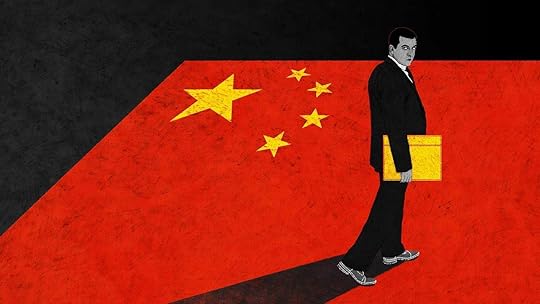
I was discussing a project today with my manager. Along the way, he mentioned that China is a “copycat” country rather than an innovation country. It made me think. Is this statement reasonable?
Have you ever wonder how did the west get the great inventions such as the compass, gun powder, movable block press, or even paper?
How about porcelain making? The truth is that China was one of the first victims of industrial espionage by none other than the “great Greek civilization” that westerners love so much.
Monks smuggled silkworms from China to the Byzantine Empire (Eastern Roman Empire), which formed its economic foundation for around 650 years.
A delegation of eastern orthodox monks under Justinian broke two monopolies in the East – China on silk production and Persia on the silk trade routes to the West – by smuggling silkworms to the West.
The resulting monopoly was the foundation for the Byzantine economy for the next 650 years until its demise in 1204.
In the 17th and 18th centuries, the Chinese alone possessed the ability to produce high-end “hard-paste” porcelain, an expensive material beloved by Europe’s elites. In the 1680s, a French Jesuit, Pere d’Entrecolles, traveled to China, where he saw the kilns and likely read technical works on the subject.
In September 1712, he wrote that while visiting Jingdezhen, then known as the porcelain capital of China, he had compiled “a minute description of all that concerns this kind of work.”
Within a few decades, a porcelain factory in Sévres, France, was producing hard-paste porcelain on par with the Chinese product. In a further twist, the British managed to swipe the secrets from the French, inaugurating Britain’s high-end porcelain industry.
China didn’t invent industrial espionage
China didn’t Invent Economic Spying.
Some might say that there were no international laws or intellectual property laws back then.
What about Britain stealing Chinese tea making secrets?
It is one of the greatest acts of corporate espionage ever committed.
The British East India Company faced the loss of its monopoly on the fantastically lucrative tea trade with China, forcing it to make the drastic decision of sending Scottish botanist Robert Fortune to steal the crop from deep within China and bring it back to British plantations in India.
Strange. It says that Britain sent a botanist to steal a unique crop from China. Does it sound like “honorable white people” are breaking laws?
Alternatively, it was just one of the thousands “isolated event”?
The U.S., and for that matter, almost every Western nation, might wish to remember their own, no-holds-barred campaigns to swipe industrial secrets.
Throughout the 18th century, every European power attempted to rip off industrial secrets.
One nation, in particular, was known for using the illicit methods to great advantage: the U.S.
In the country’s very first years, aspiring industrialists looked to Europe and quickly learned to take the easy way out, stealing instead of inventing.
Over the past 15 years, the FBI has chronicled numerous cases involving France, Germany, Japan, Israel, and South Korea. An FBI analysis of 173 nations found that 57 were covertly trying to obtain advanced technologies from U.S. corporations. Altogether, 100 countries spent some public funds on acquiring U.S. technology. Former French Intelligence Director Pierre Marion put it succinctly when he said,
“In economics, we are competitors, not allies. America has the most technical information of relevance. It is easily accessible. So naturally, your country will receive the most attention from the intelligence services.”
Glenn Greenwald in his book says the NSA eavesdrops on 20 billion communications a day — and planted bugs in Cisco equipment headed overseas.
Did you still remember the former CIA employee Edward Snowden?
Snowden claimed that the NSA planted backdoors in Cisco products
Why don’t you complain about them? Is it because when the west and its “allies” (who are militarily occupied against their will) does it, it’s honorable and just?
To summarize what had we been discussing so far, the West has been stealing from China for over a thousand years to further their economies. From silkworms to tea, until the late Qing dynasty, the West was still in an inferior trade position with their demand for Chinese products like tea and porcelain being well known.
The West ended up compensating with barbarism and drugging China at gunpoint with the Opium Wars. Hilariously, the West is perpetually in an inferior trade imbalance position. In the past, it was due to strong demand for expensive Chinese products with no reciprocal demand for western products. Today, even when China is labeled with low quality and cheap products, the West STILL suffers from a trade imbalance.
Although typically glossed over in high-school textbooks, as a young and newly industrializing nation, the U.S. aggressively engaged in the kind of intellectual-property theft it now insists other countries prohibit.
In other words, the U.S. government’s message to China and other nations today is “Do as I say, not as I did.”
In its adolescent years, the U.S. was a hotbed of intellectual piracy and technology smuggling, particularly in the textile industry, acquiring both machines and skilled machinists in violation of British export and emigration laws.
Piracy and Fraud Propelled the U.S. Industrial Revolution
Alexander Hamilton’s “Report on Manufactures,” submitted to Congress in December 1791 mentioned that to procure all such machines as are known in any part of Europe can only require a proper provision and due pains. He also added that the knowledge of several of the most important of them is already possessed. The preparation of them here is, in most cases, practicable on nearly equal terms.
Notice that Hamilton wasn’t urging the development of indigenous inventions to compete with Europe but rather the direct procurement of European technologies through “proper provision and due pains” — meaning, breaking the laws of other countries.”
When Charles Dickens arrived in Boston in 1842, he was startled to see what Americans would do for profit. He found the city’s bookstores rife with pirated copies of his novels, along with those of his countrymen. Dickens would later deliver lectures decrying the practice, and wrote home in outrage: “my blood so boiled as I thought of the monstrous injustice.”
Dark side of American “innovation.”
In the chaos following World War II, some of the greatest spoils of Germany’s resources were the Third Reich’s scientific minds. The U.S. government secretly decided that the value of these former Nazis’ knowledge outweighed their crimes and began a covert operation code-named Paperclip to allow them to work in the U.S. without the public’s full knowledge.
Joint Intelligence Objective Agency, or JOIA, had decided that these scientists were too valuable to the U.S. to allow to fall into Soviet hands. This American covert operation was one of the most guarded U.S. government secrets of the 20th century. Some of the scientists who were part of it were Otto Ambros (a chemist who served as director of the German corporation that produced the gas used in the death camps), Arthur Rudolph (rocket scientist who played a vital role in the V-2 rocket program),
Kurt Blome (virologist who pioneered Hitler’s secret germ warfare program).
To recap, America supported a nation-wide policy of intellectual theft and sheltered the 20th century’s two most hated war criminals in order to gain technology that was paid for by the blood of thousands of horrifically tortured and murdered victims – while preaching breathlessly about international law, innovation, freedom, and justice.
So tell me again, does China really invented industrial espionage?
Sources:
Philology report, Stanford University. (2011)Silk, Power & Diplomacy in Byzantium, Anna Maria Muthesius, Cambridge University. (1992)For All the Tea in China: How England Stole the World’s Favorite Drink and Changed History, Sarah Rose (2009)No Place to Hide, Glenn Greenwald (2014)Operation Paperclip: The Secret Intelligence Program that Brought Nazi Scientists to America, Annie Jacobsen (2014)The Growth of Economic Espionage: America Is Target Number One, Peter Schweizer (1996)
March 17, 2019
23 things they don’t tell you about capitalism – Book Review
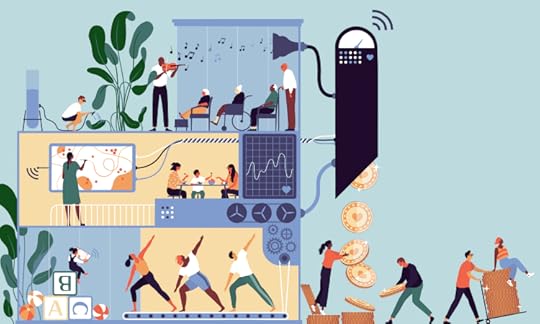 This article is a review of Cambridge Economist, Ha-Joon Chang’s book titled ’23 things they don’t tell you about capitalism’ published by Penguin Books in 2010.
This article is a review of Cambridge Economist, Ha-Joon Chang’s book titled ’23 things they don’t tell you about capitalism’ published by Penguin Books in 2010. If you have read ‘Freakonomics’ by
Dubner & Levitt and searching for a kind of book that provide the same
unconventional, myth-busting analysis on economics occurrence, this book is
definitely it!
Written in layman term without heavy
technical terms, Chang open the access gate to wide range of ordinary readers
about the working of economics. As he himself noted in the introduction, you
don’t need to be an economist to understand his book. He lay out his aim
explicitly on what he intended to do, which is to exposed free-market
capitalism, he still believes that capitalism is the best economic system, his
problem lay on specific type of capitalism which has dominated the world
economy which is the free-market capitalism.
Chang argues that free market does
not exist. Every market has rules, boundaries, and restriction which govern
them. As we accept all these rules unconditionally, we fail to see them as
market restriction. Labor market has many restrictions, you can’t hire child
laborer this day. Also, most countries have immigration control to protect
local labor market, and to hold the wage standard from falling. All these
restrictions were not been put based on sound economic reason, they are
political decisions. That is why Chang argues that the free-marketeer was as
political as the one who opposed them.
Workers in rich countries doing the
same job are paid more compared to their counterpart in poor countries. Why is
this so? It is not because of the people in rich countries are more productive,
brilliant, or creative. It is precisely because of the immigration control that
retain the wage standard. The gap also presented not because individual in rich
countries are highly educated, it is because they have better technologies,
better institutions, and better infrastructure. This line of analysis is
consistent with what was presented by Turkish American economist, Daron
Acemoglu and British political scientist, James A. Robinson in their famous
book ‘Why Nations Fail’.
Chang discussed about Alexander
Hamilton, the first Treasury Secretary and the architect of the modern American
economic system. Hamilton laid out protectionism strategy to protect American
industries ‘in their infancy’. Have he come up with the same policy that
develop America then today, Chang argued that he will be criticized by US
Treasury Department and denied loan by IMF and World Bank. Chang brilliantly
argued that developed countries forced market liberalization on developing
countries, whilst they themselves used protectionism policy when they were
developing. In other words, the rich countries said to poor countries “do what
we say not as we did”.
Why do European migrated to the U.S.
in 1880-1914? – asked Chang. He argued that the New World lack of feudal legacy
which led to higher social mobility compared to the Old World. The U.S. also
had a massive tract of land and a shortage of labour, thus wages are three to
four time higher than Europe. But he argued, today American does not have the
highest living standards. They worked longer hours and had inferior healthcare
system. Average income also did not gave an accurate living standard in the
U.S. as she had a bigger unequal income distribution, with bigger size of
underclass.
Chang also criticized many economist
approaches on the question of Africa’s poverty. Chang argued that rather than blaming free-market policy failure
to develop Africa, free-market economist shift the blame towards Africa’s
geography, climate, history, demography and ‘resource curse’. While all these
factors are not all irrelevant, the outcome can change, for example, there are
many resource-rich countries that were well developed. Some factors like
geography and history cannot solve the question as they can’t be change. The most
important factor, Chang noted, is policy. Policies can be change when they
failed, especially and evidently in Africa.
On trickle-down economics, Chang
brought evidence that the policy failed to deliver its promise and failed to
accelerate growth. The book also discussed the failure of micro-credit, as a
system to finance small enterprise and lift people out of poverty. The idea was
famously attributed to the economist who won a Nobel Peace Prize, Muhammad
Yunus and his Grameen Bank. Factors for the micro-credit failure includes the
used of the funding for consumption, not for their initial intended purpose.
While some used the funding for their business, the business failed to develop
and re-create itself once their market was overcrowded and profit fell.
One of the most profound idea I
found in the book is on how we limit our choices to make decision. Chang
brought this idea base on Herbert Simon’s thought. Human cannot easily make
decision when they were flooded with seas of information. That is why we
develop routine, although they might be a better way to do things, people stick
to routine so that they don’t have to make too many decisions. Market, Chang
argued, were far more complex with billions of product, people, and companies.
So, government intervention using regulations is justified, to limit the
uncertainties and risk in the market, so that we can make a more rational and
easier decisions.
Switzerland is one of the top few
richest and most industrialized countries, but it is by far the lowest in term
of university enrollment. Chang argued that excessive education does not lead
to more productive economy. Subject such as history and biology does not much
needed for average factory workers. He argued that knowledge-based economy is
an exaggeration with many rich countries still rely on their manufacturing output,
so, developing countries cannot skip manufacturing phase of the economic
development.
Equality is not enough, said Chang.
It does not make any sense if a rich boy and poor boy given the same
opportunity to attend school, but the poor need to compete with a hungry stomach.
So, its not just the opportunity to enter competition needs to be given, but
the condition must be equalized.
His logic about big government is a
compelling one. Big government he argued, make the economy more dynamic. When
basic income was guaranteed, people will not be afraid of changing jobs from
sunset industries into sunrise industries. When government provide re-skilling opportunities,
people can more easily shifted from less productive industry into more
productive one. People don’t afraid of loosing job because they know it will
not be the end of the world, they have a safety net, and can move on.
Overall, the book is very rich with myth busting, facts, case studies, jokes, that will transform your understanding about economics. You know that the system is broken, but it is broken for a wrong reason and can be fix. The fix, as argued by professor Chang in his concluding remark, will not be comfortable or fair, but it is needed to give a chance for billions of people, and alleviate them from poverty.
March 14, 2019
Hikayat Din Kapal : Pahlawan Yang Kehilangan Keris
 gambar ihsan Flickr
gambar ihsan Flickr*Tulisan ini adalah dari sudut pandang penulis sahaja.
Saya ada seorang kawan. Nama panggilannya Din Kapal, kerana dia juga datang dari bidang kerja yang sama seperti saya dahulu, di syarikat perkapalan walaupun dia dan saya tidak lah bekerja di bawah satu bumbung.
Di waktu lapang, kami gemar meluangkan masa bersama di kedai mamak, menghirup kopi panas bercawan-cawan, diselang seli dengan asap tembakau import (sebelum di ban kerajaan Malaysia). Macam-macam yang kami bualkan, boleh jadi hal sukan, boleh jadi hal ekonomi semasa, malah hal politik pun boleh menjadi agenda kecil kami.
Din Kapal mempunyai pegangan politik yang cukup kuat, suatu pegangan yang corak politiknya jauh berbeza jika dibandingkan dengan saya. Saya masih ingat lagi sewaktu beberapa minggu sebelum pilihan raya umum yang lepas, Din Kapal dengan yakin memberitahu saya bahawa mereka akan menang besar dan nasib rakyat akan lebih terbela dengan adil dan saksama. Malah, isu “kleptokrasi” yang sering diperkatakan beliau itu bakal diselesaikan dengan segera dan seterusnya bakal sekadar menjadi titik hitam yang lama-kelamaan akan dilupakan oleh rakyat di negara berdaulat ini.
Apa yang Din Kapal katakan pada malam itu sedikit sebanyak menjentik perasaan ingin tahu saya. Apakah benar sudah tiba masanya negara ini memerlukan acuan dan haluan yang baru? Saya hanya tersenyum dan saya katakan pada Din Kapal, jika benar apa yang beliau katakan, jika benar bahawa kerajaan baharu boleh mengubah kehidupan rakyat menjadi lebih baik, jika benar ekonomi negara berterusan berkembang pesat berlandaskan wawasan ke arah negara maju, dan badan kepimpinan baharu akan mengurus tadbir negara berpaksikan pada teras adil tanpa mengira agama dan bangsa, apa salahnya?
10 Mei 2018, Din Kapal merupakan salah seorang dari ribuan rakyat Malaysia yang bersama-sama berkongsi kegembiraan atas kemenangan perjuangan mereka, yang sekali gus menandakan bermulanya era baru negara dengan kepimpinan yang baharu, dengan azam dan matlamat yang baharu, atas nama Malaysia Baharu. Beliau malah sempat menghantar pesanan ringkas kepada saya pada pagi itu, yang antaranya masih saya ingat berbunyi “rakyat bijak, rakyat memilih”. Saya berfikir, ada betulnya kata Din Kapal itu. Dalam sesebuah hierarki kerajaan, rakyat berada di tapaknya, di kumpulan paling bawah, yang paling besar. Hilang tapak, runtuhlah semua. Tak tertegak rumah, kalau hilang sendinya. Jadi pada hemat saya, Din Kapal berkata benar. Kuasa “rakyat memilih” ini bukanlah perkara yang kita boleh pandang kecil.
Hari demi hari dibawah kerajaan baharu, Din Kapal semakin rancak berbicara soal politik. Ada kesempatan dan waktu, kami pasti berjumpa di kedai kopi dan berdiskusi tentang isu-isu semasa walaupun kadang kala perlu berganjak 3 meter dari meja. Adakalanya, saya cuba mencelah dan memberi buah pandangan kerdil dari mata seorang rakyat. Yang peliknya, hampir semua hujah yang saya berikan tidak lagi valid dimata Din Kapal hanya kerana ia datang dari kaca mata seorang pembangkang.
Minggu berganti minggu, dan secara tiba-tiba Din Kapal menyepi. Tidak ada lagi pesanan ringkas, tidak ada lagi kopi, tidak ada lagi politik. Saya pernah mencuba beberapa kali untuk bertanyakan khabar kepada beliau dan bertanya kalau-kalau beliau dalam kesusahan dan kerunsingan yang boleh dikongsi bersama. Namun hingga kini, beliau lebih selesa untuk mendiamkan diri dan menonton drama TV tiga dari duduk semeja.
March 1, 2019
Menilai Campur Tangan Kerajaan Dalam Ekonomi
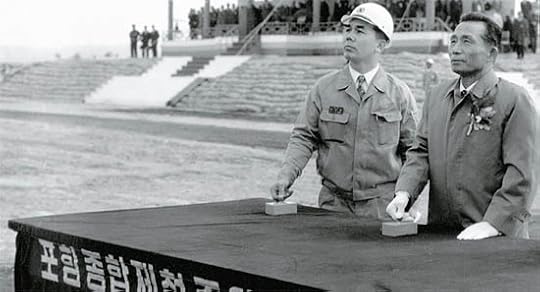 Park Tae-Joon (Kanan) merasmikan pembukaan kilang POSCO pada April 1970.
Park Tae-Joon (Kanan) merasmikan pembukaan kilang POSCO pada April 1970.Kita sering diberitahu bahawa tugas kerajaan adalah mentadbir, kerajaan sepatutnya tidak terlibat dalam bisnes. Bisnes perlu dibiarkan kepada orang bisnes. Logik kepada perkara ini adalah kerana keputusan bisnes biasanya dilakukan untuk mendapat keuntungan, tetapi keputusan kerajaan mempunyai kepentingan politik dan kemungkinan tidak menguntungkan. Kerajaan juga tidak mempunyai maklumat industri untuk membuat keputusan yang betul, perkara ini menyebabkan bisnes yang dicampuri tangan-tangan kerajaan tidak efisyen dan tidak menguntungkan. Oleh itu, pasaran perlu bebas dari campur tangan kerajaan. Ini adalah asas kepada free-market capitalism.
Saya ingin berkongsi satu cerita menarik yang dikongsi oleh ahli ekonomi dari Cambridge, Prof. Ha-Joon Chang dalam bukunya “23 things they don’t tell you about capitalism”.
Korea Selatan merupakan antara negara yang paling miskin di dunia pada tahun 1965, dan mereka mengeluarkan idea bodoh untuk membina integrated steel mill (kilang besi keluli). Sumber ekonomi utama mereka pada ketika itu adalah eksport barang mentah seperti ikan, bijih tungsten dan lain-lain. Juga perusahaan yang menggunakan tenaga buruh intensif seperti pembuatan baju. Jika dinilai dari segi teori ‘comparative advantage’, negara yang mempunyai tenaga buruh yang tinggi dengan kapital yang kecil tidak sepatutnya menceburi perusahaan yang berbentuk kapital intensif seperti pembuatan keluli.
Korea juga tidak mempunyai bahan mentah asas untuk menghasilkan keluli iaitu bijih besi dan coking coal. Suasana perang dingin ketika itu tidak membolehkan Korea mengimport bahan mentah dari China. Bahan mentah perlu diimport dari Amerika, Australia, atau Canada yang jaraknya 5 ribu hingga 6 ribu batu, yang mana akan menambahkan kos pembuatan.
Walaupun
Korea menawarkan pelbagai insentif seperti subsidi, kemudahan infrastuktur
percuma, pengecualian cukai, kos penjanaan tenaga yang rendah, tiada negara
mahu melabur dalam idea mereka. Lebih menakutkan pelabur, syarikat Pohang Iron
and Steel Company (POSCO) yang ditubuhkan pada 1968 merupakan syarikat kerajaan
dan ditadbir oleh Park Tae-Joon, seorang bekas jeneral tentera. Korea merancang
untuk membuka industri negara terbesar dan diketuai oleh seorang yang bukan
ahli bisnes!
World
Bank menasihati pelabur untuk tidak turut serta dalam projek bodoh Korea ini.
Pada tahun 1969 semua bakal pelabur termasuk Amerika, UK, German Barat,
Perancis, dan Itali menarik diri dari projek ini. Tidak berputus asa, Korea
meminta Jepun untuk menyalurkan bayaran ganti rugi perang kepada projek besi
keluli mereka, juga membantu menyediakan mesin dan nasihat teknikal.
Industri keluli Korea maju dengan pesat, mereka memulakan pengeluaran pada tahun 1973 dan sekitar tahun 1980 berjaya menjadi pengeluar low-grade steel yang paling cost-efficient. Mereka naik menjadi pemain industri utama pada tahun 1990 dan sehingga hari ini menjadi pengeluar keluli ke-empat terbesar di dunia.
February 22, 2019
Ekonomi Bukan Hitam Putih
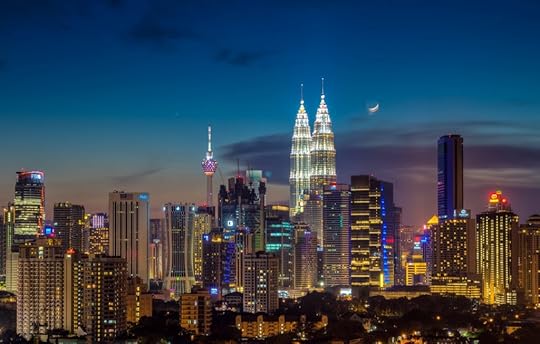
Saya bukanlah ahli ekonomi, di sekolah belajar aliran sains tak ambil subjek ekonomi. Kali pertama belajar ekonomi masa di universiti, seingat saya nama pensyarah saya adalah Radchenko semasa belajar di Russia. Dalam kelas beliau saya pertama kali dengar nama Adam Smith dan “the invisible hand”.
Selepas keluar universiti saya ada beli buku The Wealth of Nations tulisan Adam Smith, dikumpulkan 3 jilid dalam satu naskah terbitan Bantam Books. Saya mengambil masa 8 bulan untuk menghabiskan buku setebal 1264 mukasurat. Ada bab yang mudah faham seperti “division of labour” manakala banyak yang saya tak dapat hadam, terutamanya bab yang terlalui detail dan memenatkan seperti harga jagung, nilai emas dan perak.
Tahun lepas ada satu subjek ekonomi yang saya ambil untuk ICS professional exam berkenaan dengan ekonomi pengangkutan laut dan perdagangan antarabangsa. Subjek ICS ni berjaya mencetus semula minat saya untuk membaca dan memahami subjek-subjek ekonomi.
Dalam pembacaan saya, saya dapati ekonomi bukanlah sesuatu yang hitam putih. Ia bukan sains seperti mana subjek Fizik atau Biologi, ada perkara dalam ekonomi tidak boleh diberikan definisi secara objektif. Ekonomis Cambridge, Ha-Joon Chang sebagai contoh mengatakan bahawa “95% dari subjek ekonomi adalah common sense”.
Maksud saya bukan hitam putih adalah ia boleh dilihat dari banyak perspektif. Malah banyak polisi ekonomi sebenarnya polisi politik. Saya suka pendekatan sejarawan Howard Zinn, pendekatan pensejarahan yang boleh diapplikasikan dalam bidang ekonomi. Iaitu bila dikatakan sesuatu polisi itu baik, kita perlu bertanya baik untuk siapa?
Ambil contoh kelemahan nilai matawang berbanding US dollar. Dari sudut import memang tidak baik, sebab kita terpaksa membeli barang luar dengan harga yang lebih mahal. Jika kita melancong keluar negara kita terpaksa berbelanja lebih dibandingkan dengan masa matawang kita mengukuh.
Tapi dari sudut eksport kelemahan matawang akan memberi kita kelebihan. Barang kita menjadi murah dan orang luar akan lebih membeli, eksport akan meningkat. Sebab itu China mengamalkan polisi yang menyebabkan nilai Yuan lemah secara artificial. Supaya barang mereka murah dan kilang mereka boleh eksport lebih. Yang mana merupakan punca trade war hari ini apabila US mengalami trade deficit dengan China.
Begitu juga bila sebelum ini kerajaan melaksanakan polisi protectionism dalam perusahaan automobil. Jika kita lihat dari sudut syarikat automobil negara, supplier dan vendor mereka ia memang menguntungkan. Kita juga dapat mengembangkan kemahiran pekerja dalam sektor pembuatan berat, disamping boleh menyemai semangat patriotik terhadap industri tempatan.
Tapi jika kita melihat dari sudut rakyat yang terpaksa membeli kereta tempatan yang lebih kurang kualiti dengan harga yang lebih tinggi berbanding kereta import, tentu kita nampak polisi ini menjerat rakyat. Jika sektor ini diliberalisasi rakyat akan dapat membeli kereta import berkualiti dengan harga berganda lebih murah.
Jadi bila kita mendengar ahli politik berkata membangunkan pengangkutan awam tidak menguntungkan. Kita kena bertanya, tidak menguntungkan siapa? Mungkin tidak menguntungkan kerajaan dari satu segi, iaitu syarikat berkaitan kerajaan perlu mengendali kemudahan awam dengan caj minimum dan tidak menguntungkan.
Tapi ekonomi bukan hitam putih. Apabila ada infrastuktur kemudahan awam pelbagai aktiviti komersial boleh dijalankan. Sebagai contoh, orang berniaga di stesen LRT. Ia mencipta peluang pekerjaan, kerajaan dapat mengutip lebih banyak cukai dari aktiviti ini. Pekerja juga boleh pergi bekerja dengan kos yang rendah, seterusnya menggalakkkan lebih ramai orang bekerja dan kerajaan boleh mengutip lebih banyak cukai pendapatan. Tanah-tanah di sekeliling stesen pengangkutan juga naik harga dan kerajaan boleh kutip lebih banyak cukai hartanah. Ekonomi perlu dilihat dengan menyeluruh, bukan sekadar hitam putih untung rugi syarikat GLC.
Oleh itu penting kita sebagai rakyat untuk memahami bagaimana ekonomi berfungsi dan tidak bergantung semata-mata pada air liur ahli politik. Bila disebut untung atau rugi, kita kena selalu bertanya, untung dan rugi untuk siapa?
Every Nation for Itself – Book Review
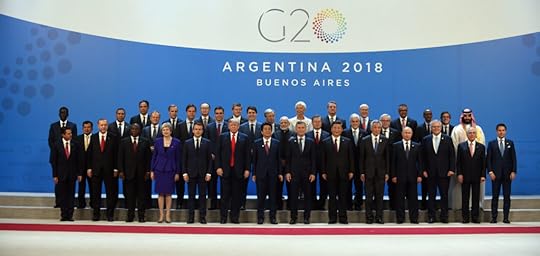
Every Nation for Itself: Winners and Losers in a G-Zero World by Ian Bremmer published by Portfolio Penguin in 2012.
The book was written by Ian Bremmer which was also the
author of ‘The End of the Free Market’. In this book, Bremmer put forward his
thesis that the world is moving toward a leaderless world, a world where no
single nation or group of nations can impose anything to other states to
coordinate international respond and solve global problems. He termed this new
world G-Zero, as opposed to the grouping of established power which created a
club G7- a club of 7 powerful nation.
The G7 has diminishing power as the U.S. power slowly wane
off and the EU disintegrates, while a much larger club like the G20 produces
nothing of substance. On contrary, we have a number of emerging nations
assuming greater economic and political power on the global arena, but none of
them was capable or willing to assume global leadership.
One of the areas which are crucial for the survival of our
planet is on the issue of global warming. This global problem cannot be solved
by individual nation, it needs a coordinated and planned international effort.
Copenhagen climate summit in 2009, for example, produced nothing substantial to
come up with a global solution. India and China unwilling to cut emission that
will hamper their economic development, they instead remind western counterpart
that today’s problem was the result of the western industrial revolution, and
they are the one who needs to foot the bill.
Bremmer explained that the waning of American global
dominance is due to their swelling debt. With China on the rise, and the
Chinese willingness to invest in U.S. debt, it is harder for the U.S. to impose
anything on China. The U.S. also spending too much money on foreign war trying
to keep the world “peace, democratic and stable”. Although many would disagree
with Bremmer assessment, Chomsky for example once stated that the best way of
ending terrorism is by stop participate in one. One can argue that U.S. wars
were good or not, but no one can deny that it help dries the U.S. from the fund
it needs for productive economic development.
China also benefited from the service of U.S. navy patrol of
the major trade route but has no incentive to take over the lead. Russia on the
other hand, since the fall of the Soviet Union has lost military clout and the
ideological appeal for much of the developing world.
The book also is dense with ‘American exceptionalism’ which
made it non-objective and highly political. Some of it was not based on fact
but an assumption. For example, in discussing the Nuclear Non-Proliferation
Treaty (NPT), Bremmer wrote that “Iran join the club but cheat”. No evidence
cited for this accusation, instead, in
the following line he said Iran “generally assumes” to be hiding its nuclear
weapons program. So, this accusation is not based on fact but an assumption.
In discussing the US-China trade relationship, Bremmer
prediction turns to be not very far stretched, as China keeps Yuan devalued,
the trade war looms as the U.S. and China have already slapped tariff to each
other. China manufacturing strategies also seem to be working, especially in
the telecommunication industries which has put the Western counterpart unease,
the latest is the Huawei case.
Market forces were also discussed in the book, he connected
the dots and explain how these forces impacted the price of commodities. The
growing middle-class for example, given rise to the demand of meat-based diet.
This, in turn, will push the grain price up as grain is needed so much more to
nourish livestock rather than feeding human. The rising price of grain will hit
poor countries the most as they spend a large portion of their income on food,
whilst in rich countries, the food is highly processed and the price fluctuation
usually lost after adding other costs such as processing, manufacturing and
transportation.
Who are is the possible winner in the leaderless world?
To this question, Bremmer suggests that countries with broad
cooperation and does not rely on any single superpower will thrive. As there is
no single power can impose any standard global system, these emerging states
can play using their own rules. Countries like Brazil, Turkey are possible
winners, as does the African continent.
States which does not obey the American leadership (Bremmer
called it rogues states) which have powerful friends will also have a good
advantage in the leaderless world. As the U.S. is plagued by war fatigue,
Europe troubled with fiscal austerity, the military threat was seen less
credible whilst economic sanctions were ineffective and porous.
Who will be the losers?
To this Bremmer answered states that still hang on to the
old power structure. They resist changes and stick to their own rules and
institutions. Institutions that have already accomplished their mission but not
yet decommissioned, such as NATO will also be on the losing end.
Closing the book, Bremmer comes out with what the future
might look like. The future according to Bremmer depends on the U.S., China,
and the other countries. This book was written in 2012, whilst this review was
written in 2019. So, we already in the future and can look back at Bremmer
proposed image of the future.
Bremmer suggested 4 possibilities, judging from the current
world affairs the most suitable candidate will be the “Wold of Regions” where
the emerging countries become stronger whilst the U.S. and China relationship
becoming more hostile. We can see the trade war currently brewing between these
two superpowers, with tariff been imposed on each other and the growing tension
on Huawei expanding their technological reach. While other countries climbing
the global political ladder. Even the U.S. sanction on Venezuela is not working
as India continue to buy Venezuelan oil. Whilst Turkey ignored U.S. threat and
continue purchasing Russian missiles system.
Bremmer concludes the book on looking at the U.S. fate in the G-Zero world. He ends the book with his last touch of American exceptionalism saying that the U.S. always has a second act and can rise again. To do this they need to accept the world as it is and innovate to adapt.
January 31, 2019
Manufacturing Consent: The Political Economy of the Mass Media – Book Review
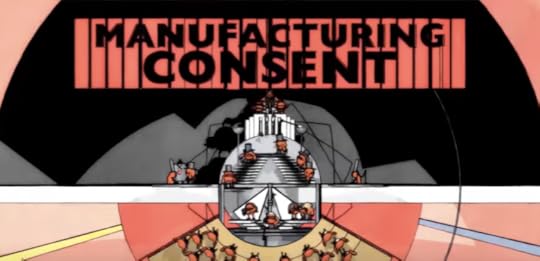
This book discussed the double-standard of U.S. foreign policies and the mass media who helped control public perception so that these policies can continue unimpeded. The propaganda propagated by U.S. media were discussed, the reasons for this phenomenon were given. Herman and Chomsky introduced a series of “filters” in their “propaganda model” which explain why the media followed state’s narrative like a herd of sheep.
In their long introduction, they pointed out that how commercialization has blurred the line between editorial and advertising. Also in the introduction were criticism of the use of chemical weapons by the U.S. including concentrated arsenic-based and dioxin-laden herbicides, Agent Orange, napalm and phosphorus bomb against South Vietnam, Laos, and Cambodia – a heinous crime which was not reported by the mass media. The media also published biased report in-line with U.S. interest, with worthy victims, such as the people killed by Pol Pot were written clearly to identify the party responsible for the killing. Unworthy victims such as the one killed by Indonesian regime under Suharto, were written passively, leaving out the party who did the killing, for example The New York Times reported “a 1965 coup led to the massacres of hundred s of thousands of supposed communists” – here we can’t tell who did the killing.
Walter Lippmann referred to the special importance of propaganda, which he called “manufacture of consent”. It serves as an organ for a popular government which fix the premises of discourse, the elite decides what the general populace can see, hear, think, and discuss.
“A mass movement without any major media support, and subject to a great deal of press hostility, suffers a serious disability, and struggles against grave odds” – Chomsky and Herman argue that many labor movement fall into serious disability once their alternative mass circulation disappeared, this is due to the contribution of one of the filter – advertising. A paper which does not center itself on consumerism and selling product will ultimately lose against other publication in which many of their readers are buyers, such publication attracted advertisers and gave them extra capital to compete.
Sourcing is also one of the filter in the mass media where “the citizenry pays to be propagandized”. Government and largesse has easy access to media coverage as they become the source of news, the media depend on them to manufacture news. They provide media relation services (paid by taxpayer) to facilitate the media. The mass media in turn will not criticize them as they are afraid to lose their source. Other critical source will have a hard time to penetrate through the media and get coverage as their resources is limited, they usually will not pass the gatekeeper.
As the authors dive in specifically on the propaganda of U.S. foreign policy, the media acted as if the government has said “concentrate on the victims of enemy powers and forget about the victims of friends”. On this basis the concept of “worthy victim” and “unworthy victim” are developed. Coverage will be given extensively toward enemy victim as they are a “worthy victim” in order to demonize the enemy. But when the same crime perpetrated by U.S., their client, or their friends, the coverage was virtually non-existent, they are regarded as “unworthy victim”. The U.S. always shows their hypocrisy in its foreign policy, suppressing bad news when their supported dictators cooperated, and denounced them once they fall.
The book also discussed the used of propaganda on foreign election result such as in Vietnam, Guantemala, and El Salvador, whenever the result does not favored U.S. desired candidate the election result was not accepted, rebellion is no longer portrayed as rejection of democracy, large turnout was no longer proof that the elected has a legitimate mass popular support. There are also planted observers by the U.S. government which was branded as “expert’ to give the media propaganda direction. We see this trend over and over again, recent case in 2019 was in Venezuela where the U.S. recognized the unelected self-declared president as a legitimate president, never mind the election result.
In cases of foreign elections the media accepted the framing and analysis provided by the states, the media role is more on channeling the information to the public. In case of the killing of the pope in 1981, the media play a larger role as agent of disinformation. The media help originating false claim,and keep the manufactured stories alive throughout the case.
Discussing the Indochina war, the book discussed how the U.S. bombed and invaded Cambodia, mobilizing the embittered peasant to the cause of the Khmer Rouge. The media facilitate U.S. aggression by framing the bombing in Vietnam as “defending South Vietnam”, and there is no recognition in the media that U.S. committed an act of aggression by invading Vietnam. The U.S. understand that it has no popular support, they were weak politically in Vietnam, political settlement thus is not an option, the only strength it has was military. At the end, the U.S. signed the Paris Agreement which incorporated many principles rejected by the U.S. in Geneva before the escalation of war started.
The result of media obedience to state power, Herman and Chomsky argued, was that the state can commit serious war crimes unimpeded, without the outrage of domestic polity. In conclusion,they concluded that the media has failed to serve their real “societal purpose”, that is to search of the truth independent from authority and enable the public to assert meaningful control over the political process by giving them information needed for intelligent discharge of political responsibilities. Instead the media functioned as a ideological institution and state propaganda tool to defend the economic, social, and political agenda of the elite group.
Refuting Hafidz Baharom’s article in Malaysiakini: On Israel and Malaysian hypocrisy
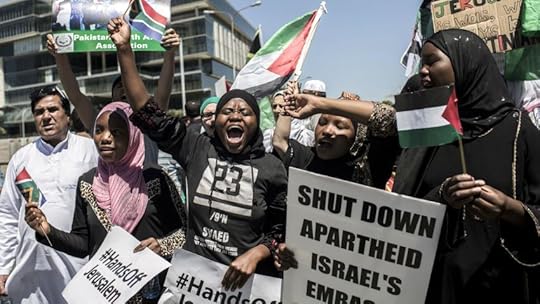
I was surprised reading this article, not that because it was written by a Malay Muslim but by its poor reasoning and lack of grip to the issue. Actually, this kind of reasoning is nothing new, if you joined a closed FB group full of Islamophobes like GE-Global, you’ll find this argument repeated everywhere. Hafidz is just parroting the same argument.
Ok, lets go into the specific detail on what he wrote. Lets start with his underlying thesis which is the bulk of the article. He argued that “why did we banned the Israeli, not others who violate human right such as the U.S., Russia, Saudi Arabia, Myanmar, China”.
There are 2 main flaws with this argument. The first one, its outlandish if not idiotic that whenever we stand for some right we are hypocrites because there are other violation elsewhere. It’s like a Penang Environment Group (PEG) voicing out about the deforestation of their mountains, was jeered off because there are other cases of deforestation in Kelantan, Sarawak, Selangor, Indonesia, Uganda, Micronesia, Palau, Panama, Mexico etc. So PEG is hypocrites unless they also championing the violation in other states. So if we used his logic, we cannot stand for anything unless we stand for all the right in this world all at once, which is impractical and almost impossible.
Second, it is a clever diversion from the real issue. Instead of arguing the substance, he resorted in moving the goal post. It will never end. Say we banned Israeli and U.S. athlete. Then someone can say what about Russia? We banned Russian. Then he will ask what about Turkey? We banned Turkish. He will ask what about Zimbabwe? It will be an infinite whataboutism. If the international community subscribed to his logic, Apartheid South Africa will still exist today as they cannot adopt a concerted targeted effort to end a particular injustice.
Reading through his article. It is not what he wrote were the only dishonest argument that I find, but what he left behind. I only can conclude that Hafidz Baharom was a real hypocrite rather than Tun or Syed Saddiq. We may not banned other athlete from other countries which we had a diplomatic ties, but Malaysia was far from silence. In case of Yemen, Malaysia pull-out our servicemen from the Saudi-led campaign. In the case of Uighur, Malaysia defied China by releasing Uighur detainees. In case of Rohingya, we even built them a hospital! So, while we might not banned their athletes, we respond according to the situation with a diplomatic ties we have. We, on the other hand, never recognized Israel, we have no ties with them. If he had a problem with that, maybe he can try apply an Israeli citizenship.
Then, things get more interesting. Why we singled out Israel? He claimed “Probably because it is convenient, and that is all. It is easier to ban a small, tiny nation we don’t have to trade directly with rather than the superpowers of the world.” Tun made it clear why, instead he used his made-up imagination to put up his case.
Nevermind, let’s look at this flimsy imagination. If we look at the fact, this argument collapsed spectacularly. He failed to mention that Israel is a “mini-military superpower” and was the 7th largest arms exporter in the world. Israel is armed to the teeth with a nuclear capability. Israel even wield huge political power influencing the U.S., Israel has meddled in U.S. through AIPAC long before the accusation of Russian meddling, that is why they are immune to UN resolutions. Just last Monday, U.S. senate advances bill to combat the boycott of Israel. If a country is a tiny country base on its geographical borders, tell me how come a small European island called Britain can colonize India for 200 years.
Hafidz is plain wrong and don’t even know what he is talking about.
Lastly, and this is the most funny of all. Where he used his assumption to make a case which he did not substantiate. He said, I quote “you won’t find Malaysian Muslims suddenly insisting of boycotting haj and umrah packages to Saudi Arabia over Yemen ever.” Farouk Musa of IRF has indeed call for boycott of Saudi Arabia over war in Yaman. So, again, his argument i.e. imagination collapsed miserably.



